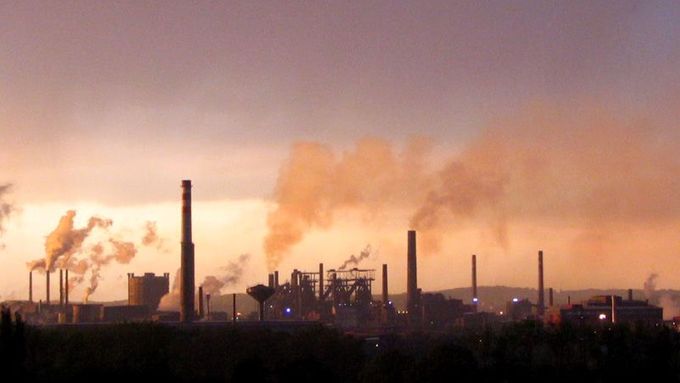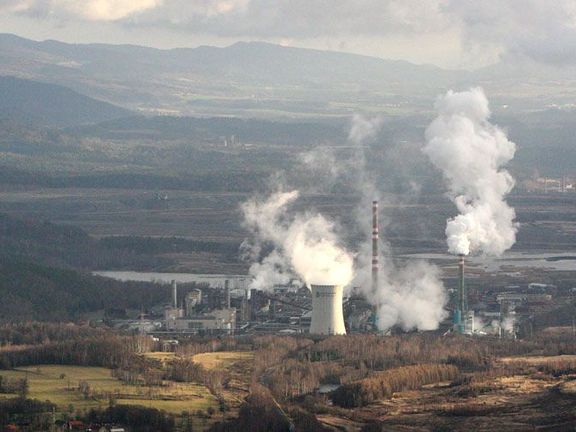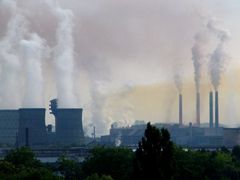Ostrava - The Czech Minister of Environment Martin Bursík has been preparing his answer to an open letter he received from the citizens of Radvanice and Bartovice districts of Ostrava one month ago.
In the letter, a member of the regional authorities for the Civic Democratic Party (ODS) Jaromír Slíva is asking the minister to solve the problem of air pollution in the region.
"I appeal to you, Mr. Minister, since it is in your competence to improve the situation," wrote Mr. Slíva.
Radvanice and Bartovice are located very close to the Czech branch of the world largest steelworks company ArcelorMittal and are considered a place with the worst quality of air in Europe.
"There are no other solutions than a radical one, because health of local citizens is gravely endangered by many harmful elements and they have no patience left at all," informed Slíva.
However, Mr. Slíva hasn't received the answer yet.
The spokesman of the Ministry of Environment Jakub Kašpar informed that Minister Bursík is still waiting for necessary information which is being collected by his colleagues.
Doctors warn
Meanwhile, another record was broken in Radvanice and Bartovice.
The law on air protection sets the maximum of 35 days in a year when the concentration of airborne dust can exceed legal limits.
This year in the two districts of Ostrava, the maximum figure has been reached on 13 February.
It is two days ahead than previous year when there were altogether 216 days of exceeding the dust limits.
Doctors and health officers warn that health of tens of thousands is in danger. Small elements of the airborne dust merge with carcinogenic substances that can get into human organisms and cause serious health problems even when the affected person has moved away from the polluted area.
"Children can bear the effects of their childhood spent in poisonous atmosphere for all their life. We cannot ask our citizens again to obey the ruthless and arrogant of the powerful," writes Slíva in his open letter to Bursík.
Slíva is even considering to file a lawsuit against the Czech Republic at the European Court of Justice.
"The situation is very critical," admitted the spokesman of the Ministry of Environment. "Unfortunately, no fast redemptive measure is known to us. The ministry cannot simply go there and clean the air. The main instruments to improve the situation are in the hands of the regional and municipal authorities."
Municipal authorities of Ostrava are planning to sign an agreement with the city's largest polluters, expecting them to improve the situation by the year 2011. However, the agreement is not binding.
"It is a so called voluntary agreement on emission reduction," informed the Deputy Mayor of Ostrava Dalibor Madej (ODS).
"Currently, a contract with ArcelorMittal is the order of the day. We are thinking of signing some similar agreements with all the companies," he said.
"Commissions, subcommissions, vague agreements"
However, Jan Šrytr from a non-governmental company Environmental Law Service (EPS) from Brno sees such contracts of little effect. According to him, their implementation is hard to be supervised.
"So far, all efforts aimed at improving the situation in Ostrava have shrunk into endless creation of various commissions and subcommisions, or signing vague and non-enforceable agreements with polluters," complained Šrytr.
The EPS has elaborated an analysis that shows the regulation limits imposed upon the largest polluters are too soft.
"Limits set in such a way don't take into account the environmental situation. Nobody knows what clue was used to set the emissions limits. Nevertheless, these can be reevaluated and reformulated afterwards. And we have asked regional authorities to do precisely this," explained Šrytr.
The regional authority in fact already plans to reexamine the emissions ceilings for large industrial companies and prepare more strict limits.
Petitions are signed
There is a growing petition movement in Ostrava and the regions that surround the city, but also in Karviná area. The first petition was initiated in spring last year in Radvanice, other emerged in nearby Šenov.
Authors of the petition and those that have signed it ask for the legal limits of harmful elements in the air be respected and the information about pollution be regularly monitored.
They also want the authorities to ban a construction of a new coking plant in the region allegedly planned by AcelorMittal.
The petitions, signed approximately by two thousands citizens so far, are going to be sent to the ArcelorMittal company as well as to the Office of the Government, the Ministry of Environment, the Czech Environmental Inspectorate, the Moravian-Silesian Region´s as well as to the Ostrava City Authorities.







